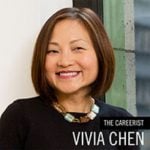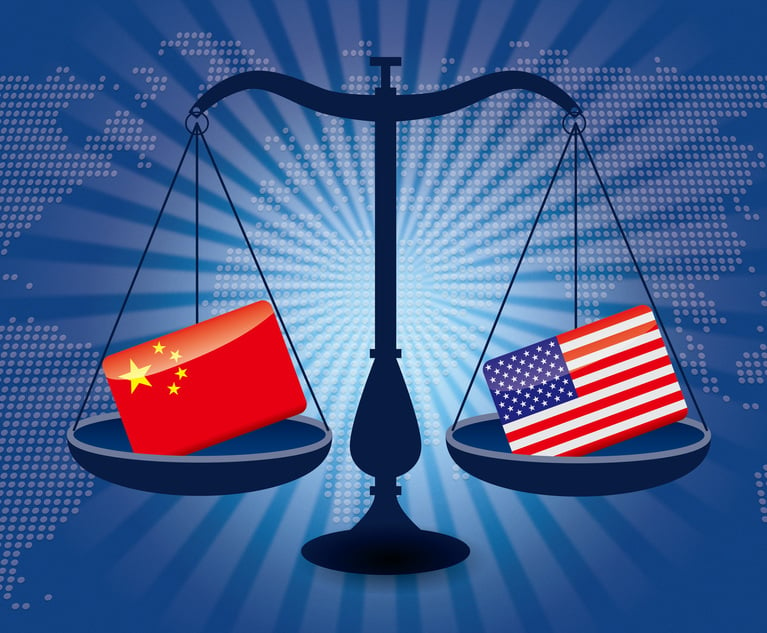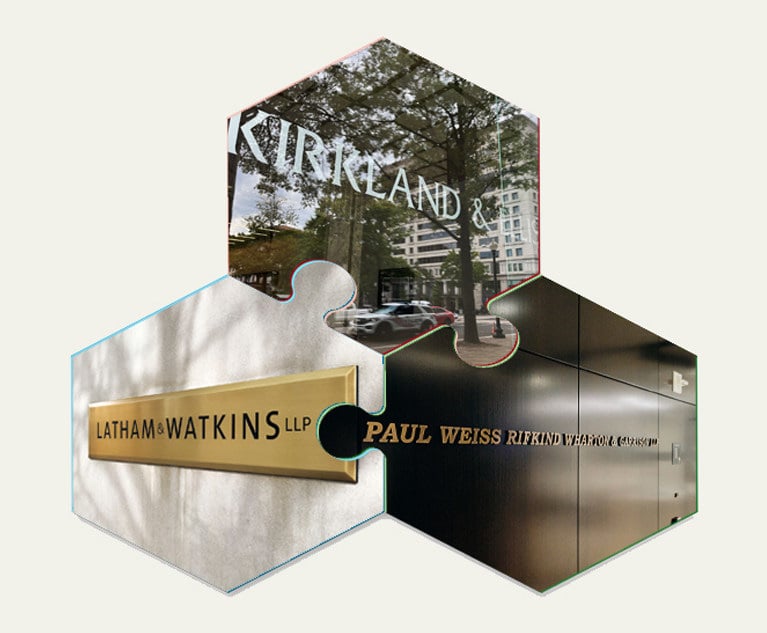Practically Invisible: Kirkland & Ellis' New Black Partners
The law firm made a jaw-dropping number of partners this year—141 to be exact. But here's the flip side: Only three black lawyers appeared among that sea of faces.
October 09, 2019 at 02:02 PM
4 minute read
 Photo: Shutterstock
Photo: Shutterstock
Friendly advice to law firms announcing new partners: Don't put up photos of your latest elevations unless there's a modicum of diversity among those happy faces.
Paul, Weiss, Rifkind Wharton & Garrison learned that lesson the hard way earlier this year. After publishing photos of its fresh batch of partners—11 men and one woman (all white)—the firm got slammed for its super-Caucasian, male class.
 Kirkland & Ellis is falling into the same trap. As you probably know, Kirkland made a jaw-dropping number of partners this year—141 to be exact. But here's the flip side: Only three black lawyers appeared among that sea of faces. (I'm basing this on appearance, as Kirkland has not responded to my request for comment.) As for women and Asians, the firm is doing better: I counted 46 women and about a dozen or so Asians, though that included those in its Asia offices.
Kirkland & Ellis is falling into the same trap. As you probably know, Kirkland made a jaw-dropping number of partners this year—141 to be exact. But here's the flip side: Only three black lawyers appeared among that sea of faces. (I'm basing this on appearance, as Kirkland has not responded to my request for comment.) As for women and Asians, the firm is doing better: I counted 46 women and about a dozen or so Asians, though that included those in its Asia offices.
But let's get back to the issue of black partners, because that's where many firms have trouble. While making very few or even zero black partners in a given year might be explainable when the partnership class is quite small (arguably, the situation with Paul Weiss), it's troubling when the class is large.
As I've reported, black lawyers seem to be lagging behind in the partnership race this year. And that's particularly notable at firms with relatively big partnership classes, such as White & Case (41 new partners) and Jones Day (46 new partners), where there were no new black partners at all.
That said, no firm compares with Kirkland for the scale of its partnership class. So, yes, I find it shocking that only three black lawyers made the cut out of a pool of 141 new partners in a firm with 2,300 lawyers.
What that means is that black lawyers aren't even making it to starting gate, even though the gate is wide. Under Kirkland's system, junior partners only get the privilege of auditioning for equity status. As my colleague Patrick Smith notes in his recent article about Kirkland's new partners, historically, only about 20% of its income partners eventually became equity partners after a four-year tryout period.
Which raises these questions: How daunting are the odds for black lawyers to attain equity? And how many black partners at Kirkland have equity at all?
We don't know the answer and Kirkland isn't saying. (Law.com's Dylan Jackson reports that other Am Law 100 firms—King & Spalding; Gibson, Dunn & Crutcher; Bryan Cave Leighton Paisner; and Sidley Austin—also refuse to break down equity versus nonequity partners in their survey responses.)
But keep this in mind: Minorities struggle mightily to get out of the income partner ranks. According to Jackson, "minority lawyers disproportionately occupy the nonequity partnership tier of the nation's largest-grossing law firms compared to their white colleagues."
Is Kirkland at the bottom of the diversity ranking? Actually, not. It ranked 45th on ALM's diversity scorecard this year, up from 57 in 2018. Black lawyers comprised 1.6% of all partners and 2.8% of all lawyers, while Asian Americans made up 7.4% partners and 10.6% of all lawyers. For Hispanics, the breakdown was 3.2% partners and 4.4% lawyers.
Though Kirkland is certainly not alone (there are plenty of Am Law 100 firms with 1% or fewer black partners), that 1.6% figure for black partners is worrisome, considering that it's a mega firm with 2,300 lawyers that generated revenue of over $3.7 billion last year. This is no litigation boutique; rather, it's a big business with a high profile. And as such, we expect it to do better.
It's difficult to say why it's so tough for black lawyers to become partners—contract or equity—at Kirkland. I have to assume that its up-or-out system complicates diversifying the partnership ranks. If a firm is so focused on the bottom line, which is true for many firms these days, how does something as complicated and nebulous as diversity compete for priority?
It's a brutal process all around. For anyone aspiring to equity status, it's bound to be a long, long climb. For black lawyers, it must seem damn impossible.
Related posts: But Where Are the Black Partners?; The Unicorn Watch; Unicorn Watch-Part 2.
Contact Vivia Chen at [email protected]. On Twitter: @lawcareerist.
This content has been archived. It is available through our partners, LexisNexis® and Bloomberg Law.
To view this content, please continue to their sites.
Not a Lexis Subscriber?
Subscribe Now
Not a Bloomberg Law Subscriber?
Subscribe Now
NOT FOR REPRINT
© 2025 ALM Global, LLC, All Rights Reserved. Request academic re-use from www.copyright.com. All other uses, submit a request to [email protected]. For more information visit Asset & Logo Licensing.
You Might Like
View All

Letter from Asia: As American Firms Retreat, Will Loyal UK Firms Regain Market Share In Asia?


Change Is Coming With the New Trump Era. For Big Law, Change Is Already Here
6 minute readTrending Stories
Who Got The Work
J. Brugh Lower of Gibbons has entered an appearance for industrial equipment supplier Devco Corporation in a pending trademark infringement lawsuit. The suit, accusing the defendant of selling knock-off Graco products, was filed Dec. 18 in New Jersey District Court by Rivkin Radler on behalf of Graco Inc. and Graco Minnesota. The case, assigned to U.S. District Judge Zahid N. Quraishi, is 3:24-cv-11294, Graco Inc. et al v. Devco Corporation.
Who Got The Work
Rebecca Maller-Stein and Kent A. Yalowitz of Arnold & Porter Kaye Scholer have entered their appearances for Hanaco Venture Capital and its executives, Lior Prosor and David Frankel, in a pending securities lawsuit. The action, filed on Dec. 24 in New York Southern District Court by Zell, Aron & Co. on behalf of Goldeneye Advisors, accuses the defendants of negligently and fraudulently managing the plaintiff's $1 million investment. The case, assigned to U.S. District Judge Vernon S. Broderick, is 1:24-cv-09918, Goldeneye Advisors, LLC v. Hanaco Venture Capital, Ltd. et al.
Who Got The Work
Attorneys from A&O Shearman has stepped in as defense counsel for Toronto-Dominion Bank and other defendants in a pending securities class action. The suit, filed Dec. 11 in New York Southern District Court by Bleichmar Fonti & Auld, accuses the defendants of concealing the bank's 'pervasive' deficiencies in regards to its compliance with the Bank Secrecy Act and the quality of its anti-money laundering controls. The case, assigned to U.S. District Judge Arun Subramanian, is 1:24-cv-09445, Gonzalez v. The Toronto-Dominion Bank et al.
Who Got The Work
Crown Castle International, a Pennsylvania company providing shared communications infrastructure, has turned to Luke D. Wolf of Gordon Rees Scully Mansukhani to fend off a pending breach-of-contract lawsuit. The court action, filed Nov. 25 in Michigan Eastern District Court by Hooper Hathaway PC on behalf of The Town Residences LLC, accuses Crown Castle of failing to transfer approximately $30,000 in utility payments from T-Mobile in breach of a roof-top lease and assignment agreement. The case, assigned to U.S. District Judge Susan K. Declercq, is 2:24-cv-13131, The Town Residences LLC v. T-Mobile US, Inc. et al.
Who Got The Work
Wilfred P. Coronato and Daniel M. Schwartz of McCarter & English have stepped in as defense counsel to Electrolux Home Products Inc. in a pending product liability lawsuit. The court action, filed Nov. 26 in New York Eastern District Court by Poulos Lopiccolo PC and Nagel Rice LLP on behalf of David Stern, alleges that the defendant's refrigerators’ drawers and shelving repeatedly break and fall apart within months after purchase. The case, assigned to U.S. District Judge Joan M. Azrack, is 2:24-cv-08204, Stern v. Electrolux Home Products, Inc.
Featured Firms
Law Offices of Gary Martin Hays & Associates, P.C.
(470) 294-1674
Law Offices of Mark E. Salomone
(857) 444-6468
Smith & Hassler
(713) 739-1250










